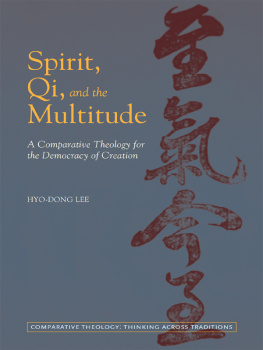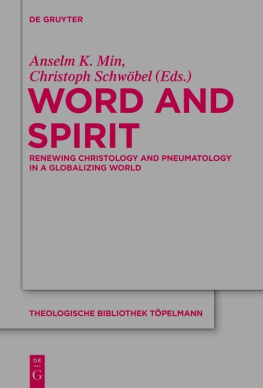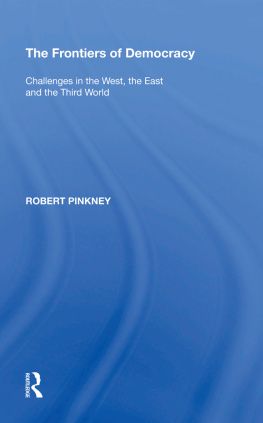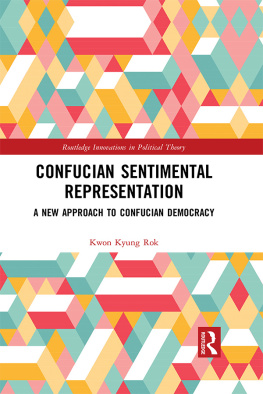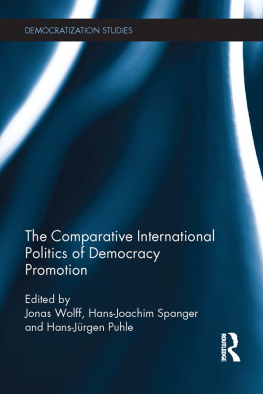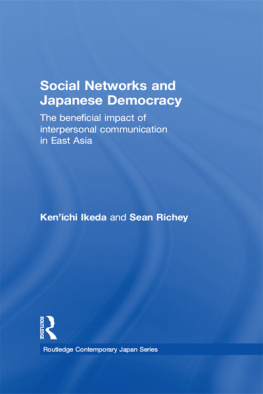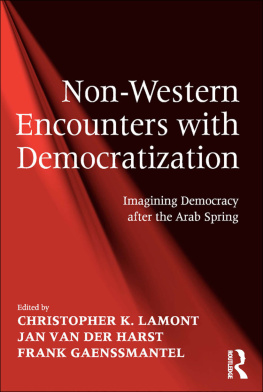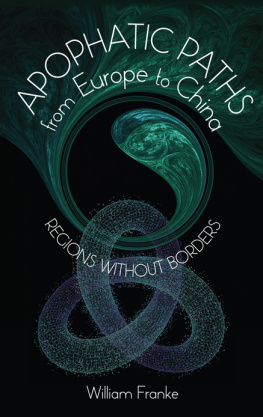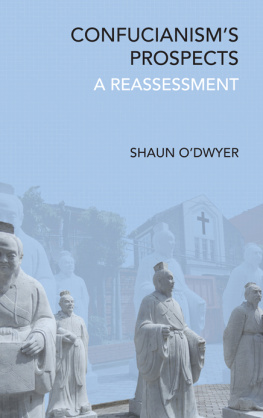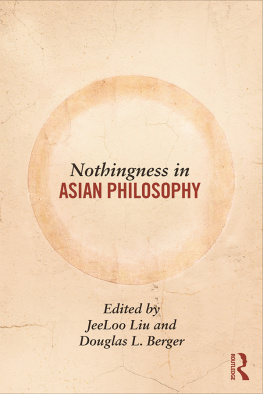SPIRIT, QI, AND THE MULTITUDE
COMPARATIVE THEOLOGY: THINKING ACROSS TRADITIONS
Loye Ashton and John J. Thatamanil, Series Editors
This series invites books that engage in constructive comparative theological reflection that draws from the resources of more than one religious tradition. It offers a venue for constructive thinkers, from a variety of religious traditions (or thinkers belonging to more than one), who seek to advance theology understood as deep learning across religious traditions.
SPIRIT, QI, AND THE MULTITUDE
A Comparative Theology for the Democracy of Creation
HYO - DONG LEE
Fordham University Press NEW YORK 2014
Copyright 2014 Fordham University Press
All rights reserved. No part of this publication may be reproduced, stored in a retrieval system, or transmitted in any form or by any meanselectronic, mechanical, photocopy, recording, or any otherexcept for brief quotations in printed reviews, without the prior permission of the publisher.
Fordham University Press has no responsibility for the persistence or accuracy of URLs for external or third-party Internet websites referred to in this publication and does not guarantee that any content on such websites is, or will remain, accurate or appropriate.
Fordham University Press also publishes its books in a variety of electronic formats. Some content that appears in print may not be available in electronic books.
Library of Congress Cataloging-in-Publication Data
Lee, Hyo-Dong.
Spirit, Qi, and the Multitude : a comparative theology for the democracy of creation / Hyo-Dong Lee.
pages cm(Comparative theology: thinking across traditions)
Includes bibliographical references and index.
Summary: A comparative theological and philosophical analysis of the concept of spirit in the West and the concept of qi (chi) in East Asia in regard to their respective and mutually illuminating potentials for sustaining a pluralistic and democratic metaphysical vision of the cosmosProvided by publisher.
ISBN 978-0-8232-5501-6 (hardback)ISBN 978-0-8232-5502-3 (paper)
1. Qi (Chinese philosophy) 2. Philosophy, Korean. 3. Philosophy, Chinese. 4. Spirit. 5. Philosophy, Modern. 6. Cosmology. I. Title.
B127.C49L4 2014
181.11dc23
2013014386
Printed in the United States of America
16 15 14 5 4 3 2 1
First edition
for Younhee and Saehan
CONTENTS
This book has been long in coming. The job of Christian theologians is an arduous and often dispiriting one today, unless they are blissfully unaware of either the checkered history of the theological tradition to which they are committed or the confusing and even perilous cultural and religious landscapes, full of discordant voices and diverging paths, which they have to navigate. A case in point is a theologian from a corner of East Asia (Korea) who has been a recipient of the ambiguous legacy of missionary Christianity with all its blessings and woes, and who has migrated to the de facto center of the Western-dominated global order (the United States) and participated in its benefits and hazards, like myself. Although I do not want to be too autobiographical and present this book exclusively as a narrative of my search for religious and cultural identity, my personal background (male, heterosexual, middle-class, Korean, Christian, postcolonial, Western-educated, diasporic, and so on) has certainly had a lot to do withand much complicatedmy preoccupation in writing this book: to reenvision the trinitarian God in a deep encounter with my East Asian and Korean heritage.
If there is a single running threada cantus firmusand a driving concern in this task of comparative-theological reconstruction, it is the idea of democracy and what I believe is the pressing need for its theological articulation in the contemporary global context filled with various forms of political oppression, economic exploitation, and cultural marginalization. By democracy I do not mean narrowly the well-known concept in political philosophy that has its historical provenance in the Western political tradition and serves as the animating ideal for the diverse forms of government by the elected representatives of the citizens of the modern nation-states today. I am using the term more broadly as a cipher for the notion that people and ultimately all creatures have the power to rule and to create themselves. My comparative-theological reflection on such a notion of democracy draws its inspiration and impetus primarily from the biblical narrative of the coming of the Holy Spirit on Pentecost on the one hand and the Donghak (Eastern Learning) account of the descent of Ultimate Gi (Qi) on the other. In my assessment, both signal the advent of a new age in which all of the creaturely multitude are empowered to release their spontaneous capacity for self-creativity, self-determination, and self-rule. That is why my focus is on a pneumatocentric or Spirit-centered reconstruction of the Trinity that attempts to follow the wild wind of the Spirit, which truly blows where it willEast and West, North and South. In this book, I track its movement East and West first. I bring together the Western, Christian theological concept of Spirit (or its philosophical analogues) and the East Asian, Daoist, and Confucian notion of qi (which is better known in the West as chi and read as gi in Korean) in order to construct theological and philosophical underpinnings for the idea of democracythat is, what may be called a metaphysics of democracy. In that sense, this book is not a full-blown eco-political theology that would trace the movement of the Spirit North and South, but rather the metaphysical prolegomenon to such a work.
It is a truism to say that writing is never the work of a solitary individual. I have been supported and nurtured along the way by many who put faith in me as a theologian and scholar. I am especially indebted to Peter C. Hodgson, Catherine Keller, and Heup Young KimPeter for my continuing fascination with the liberating winds of the Spirit and my study of Hegel; Catherine for sparking my interest in Whitehead and Deleuze, not to mention her own tehomic theology; and Heup Young Kim for being a model for my comparative-theological engagement of the East Asian traditions, especially Confucianism and Donghak, with his theology of tao. I also extend my sincere appreciation to my colleagues at Drew University Theological School, especially Robert Corrington, Wesley Ariarajah, and Christopher Boesel, and my students. Their encouragement, support, and thought-provoking questions have been invaluable, particularly when my thinking hit roadblocks.
I am genuinely grateful to Fordham University Press and its editorial staff for their adventurous spirit, excellent leadership, and impeccable attention to detail in publishing this book. My special thanks go to Helen Tartar, editorial director. Without her enthusiasm shown my book, it may not have seen the light of day.
Above all, Younhee, my spouse, and Saehan, our son, deserve my deepest gratitude. For the last several years, as this book took shape, they put up with my countless hours of sitting with my laptop in front of me. I dedicate this book to them.
One evening in the spring of 1897 in Korea, in a tiny village of peasants southeast of what is now Seoul, the capital city, a small group of people gathered in a housea thatched hutto perform the customary Confucian ritual of honoring the ancestors. When the food and drink offerings were set up on a table to face the wall, where the spirits of the ancestors were supposed to take a seat, the spiritual leader of the group, seventy-one-year-old Choe Si-hyeong ( 18271898 C.E.) whose honorific name was Haewol (), asked the group to reverse the table setup: From now on, when you perform the ritual, set up the offerings to face yourselves.

